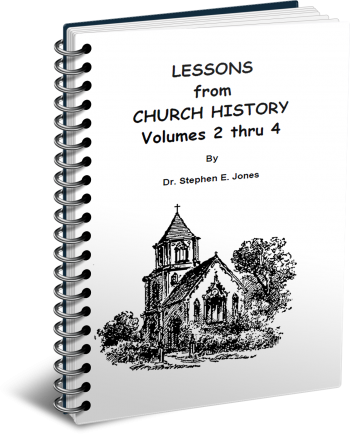Latest Posts
View the latest posts in an easy-to-read list format, with filtering options.

Volumes 2-4. This is the history of the Church from the Roman War (66-73 A.D.) to Constantine and the Council of Nicea in 325 A.D. with lessons to be learned from it.
Category - History and Prophecy

The third century bishop, Cyprian, stated that “no one can have God for his father who has not the church for his mother.” (Schaff, History of the Christian Church, Vol. II, p. 173). That bishop provided the clearest ideas of what came to be the Catholic Church, although, interestingly enough, Schaff adds that “he was anti-papal and anti-Roman when he differed from the pope” (p. 172).
Schaff traces the progression of Church organization this way on page 174,
“It blindly identified the spiritual unity of the church with unity of organization, insisted on outward uniformity at the expense of free development, and confounded the faulty empirical church, or a temporary phase of the development of Christianity, with the ideal and eternal kingdom of Christ, which will not be perfect in its manifestation until the glorious coming of its Head.
“The Scriptural principle, ‘Out of Christ there is no salvation,’ was contracted and restricted to the Cyprianic principle: ‘Out of the (visible) church there is no salvation;’ and from this there was only one step to the fundamental error of Romanism: ‘Out of the Roman Church there is no salvation’.”
Cyprian himself did not make that final leap in establishing Roman supremacy, for that step had already begun to assert itself with Victor fifty years earlier. Cyprian firmly made the Church the only vehicle for salvation, while Victor asserted that the various churches and bishops could retain that authority only if they submitted to the Roman church (i.e., its bishop). The combination of the two ideas, however, gave birth to the Roman Catholic Church.
Thus, the Church gradually reverted back to Old Covenant thinking, though it would have vigorously denied this. The Old Covenant, Paul says, was “Hagar” (Gal. 4:24), which puts people into bondage. In other words, it makes salvation dependent upon one's works. More than that, it makes salvation dependent upon fleshly things—other men in particular—by equating the earthly organization with the heavenly.
The problem goes back to Exodus 20, when God spoke the Ten Commandments to the people, and they all ran away. In Exodus 20:19, we find the origin of this bondage:
{Exodus 20:19} 19 Then they said to Moses, “Speak to us yourself and we will listen; but let not God speak to us, lest we die.”
This is the origin of the Old Covenant’s indirect relationship with God. The people demanded that a man—in this case, Moses—receive the revelation from God and then tell them what God says. This set the precedent for an indirect relationship with God, where men's ears were stopped from hearing God's voice directly. That is one of the primary characteristics of an Old Covenant relationship with God.
This later became the problem in the Church as it developed in the second and third centuries. It came to be said that no one could have a relationship with God apart from Church leadership—i.e., having a successor to ”Moses” to tell them the truths of God. This would not have been a problem if they had retained Christ alone as “Moses,” for indeed Christ was the prophet like unto him (Deut. 18:15; Acts 3:22). Jesus is indeed the Mediator between God and man (1 Tim. 2:5), and no other, Paul says. But the Church transformed its own bishops into secondary mediators through whom salvation must come. Later, to these were added Mary, called a Mediatrix, and other saints who were called upon to intercede for the people.
In time, the Church organization, complete with its hierarchy and structure, became the sole means by which any man could be saved, and a man's right standing (relationship) with the hierarchy was said to determine his right standing (relationship) with God. In this way, the Church became identical to Old Testament Judaism, with its temple and priesthood. Just as the priests of Judaism claimed the power to determine whether a person was a true believer or not—based upon its own decisions supposedly ratified by God—even so did the Church develop into the same pattern of Old Covenant thinking.
The key truth in this matter is to know that leadership ought to bear witness to God and not to presume to speak for God by their own carnal minds.
In an ideal Kingdom, there is no need for leadership (authority), for everyone hears the voice of God perfectly. Authority is a consequence of the fall of Adam, for Adam was given the place of authority only after the original sin. It is only in the presence of disagreement that authority is necessary, for someone must determine which course of action to take, lest nothing be done at all. When we look at our own Congress and see the many opinions presented on each issue, how would anything be accomplished if it required complete agreement in order for any bill to be passed?
In the full manifestation of the New Covenant, no one will have to teach his neighbor of the will of God, for everyone will hear for themselves (Heb. 8:11). But in the meanwhile, we do not live in such a perfect world, nor do all men have the ability to hear the voice of God without idols in the heart to corrupt that word. For this reason, leadership was established even in the early Church. It was a practical necessity. But in order for this to work, it was conditional upon the ability of that leadership to hear the voice of God.
This precisely defined the weak link in the whole structure. As time passed and as more and more leaders (bishops) were established, it was inevitable that some of them would hear the voice of their carnal mind rather than the voice of the Spirit. This is primarily evidenced by the gradual consolidation toward priestly power and the people's servitude. As a general rule, the Holy Spirit gives leaders humility, compassion, and a heart of service. The carnal mind gives leaders pride, ambition, and greed.
If Church leadership had continually sought to know God's will, in order to know how to exercise authority, even as in the example of Moses, the religious system would have worked about as well as it did in the days of Moses (and Joshua, of course). And there is no doubt that the Church had some good leadership in those days, but not all were good. The Church itself believed that there were heretics among the Church leaders, and for this reason the Roman bishops increasingly desired to unite the Church under one head.
In a sense, the many heresies pushed the Church into a place where it felt it had to defend itself and its doctrines by erecting hierarchical structure. They held Church councils to determine true doctrine by majority vote, and as time passed the contentious spirit of those councils made it obvious that the carnal minds of men were being called upon to determine truth. The Church developed its own “traditions of men,” even as the Jews had done in earlier days.
The result was that Christian people increasingly came under bondage to a religion which was called the Church, even as the Jews had been in bondage to their own religion and its hierarchy. Eventually, individual Christians were discouraged or forbidden to hear God for themselves, for if they were to hear anything that differed from that which the bishop was teaching, they were persecuted or excommunicated as heretics. It was thus presumed that the Holy Spirit was resident only in the bishops, and the Holy Spirit was suppressed in ordinary people.
While these Church policies were designed to bring unity, their unity came to be based not upon Love, but upon fear. In the Old Testament, the prophets ran into the same problem and were stoned as false prophets. They had to overcome fear (that great heart idol), and their revelation was refined in the fire of persecution. The Church also came to rule the people by fear, and this was another indication that it was reverting slowly to Old Covenant religion.
Eventually, the Church burned people at the stake, even as Judaism had stoned the prophets. When they lost the power of the Spirit, they reverted to the power of the Sword. We, however, look for a better Kingdom that is truly New Covenant. It is imperative, then, that we know how the Church under Pentecost failed to find it.